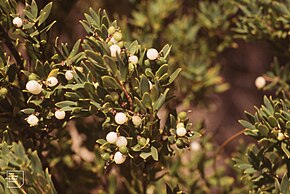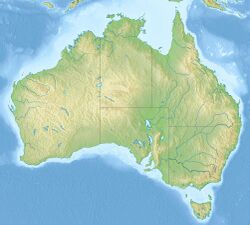Earth:Discovery Bay (Australia)
| Discovery Bay | |
|---|---|
 West Victoria Coast, Bridgewater, Cape Nelson, Portland, Point Danger | |
| Location | Eastern South Australia and western Victoria |
| Coordinates | [ ⚑ ] : 38°03′S 140°52′E / 38.05°S 140.867°E[1] |
| Type | An open oceanic embayment[2] |
| rivers, streams, precipitation">Primary inflows | Glenelg River, Bridgewater Lakes |
| rivers, streams, evaporation">Primary outflows | Southern Ocean |
| Basin countries | Australia |
| Average depth | 30–60 m (98–197 ft)[3] |
| Shore length1 | 70 km (43 mi) |
| Frozen | never |
| Settlements | Port MacDonnell |
| 1 Shore length is not a well-defined measure. | |
Discovery Bay is an open oceanic embayment[2] lying along the coast of eastern South Australia and western Victoria in south-eastern Australia .
Location and features
Facing the Southern Ocean, Discovery Bay extends approximately 70 kilometres (43 mi) from Cape Northumberland, near Port MacDonnell, South Australia in the northwest, to Cape Bridgewater in the southeast, 20 kilometres (12 mi) west of Portland in western Victoria.[4] Cape Northumberland is the southernmost point of mainland South Australia.[citation needed] The Glenelg River is the principal inflow and enters the bay near the town of Nelson.
The bay was named by explorer Thomas Mitchell when he came down the river on 20 August 1836.[5][6]
The South Australian section of the bay's coastline is protected by the Lower South East Marine Park while the Victorian section of the coast is protected in the Discovery Bay Coastal Park. The waters at the eastern end of the bay, adjacent to Cape Bridgewater, are protected by the Discovery Bay Marine National Park.[7][8]
See also
- Discovery Bay (disambiguation)
- Piccaninnie Ponds Conservation Park
References
- ↑ "Lake Burrumbeet". Vicnames. Government of Victoria. 2 May 1966. https://services.land.vic.gov.au/vicnames/place.html?method=edit&id=1318.
- ↑ 2.0 2.1 Roy, P. S. et al. (2001). "Structure and Function of South-east Australian Estuaries". Estuarine, Coastal and Shelf Science 53. doi:10.1006/ecss.2001.0796.
- ↑ "Discovery Bay Marine National Park". Parks Victoria. Government of Victoria. 14 January 2013. http://parkweb.vic.gov.au/explore/parks/discovery-bay-marine-national-park.
- ↑ "Search result for "Discovery Bay (Bay)" (Record no. SA0020163) with the following layers selected - " Place names (gazetteer)"". Property Location Browser. Government of South Australia. http://maps.sa.gov.au/plb/#.
- ↑ Mitchell, Thomas (1838), Three Expeditions into the interior of Eastern Australia, 2, London: Boone, http://www.gutenberg.org/ebooks/13033
- ↑ Bird, Eric (12 October 2006). "Place Names on the Coast of Victoria" (PDF). Australian National Placename Survey (ANPS). http://www.anps.org.au/documents/VIC_coastal.pdf.
- ↑ "Lower South East Marine Park Management Plan". Department of Environment, Water and Natural Resources. p. 26. http://www.environment.sa.gov.au/files/60f0c3d2-c3b7-4894-adea-a11700a29b6a/mp-gen-19lowersoutheast-managementplan.pdf.
- ↑ "Lower Glenelg National Park, Discovery Bay Coastal Park". Parks Victoria. Government of Victoria. January 2014. http://parkweb.vic.gov.au/__data/assets/pdf_file/0004/315670/Park-note-Lower-Glenelg-NP-Discovery-Bay-CP-1.pdf.
External links
- "Discovery Bay Parks Management Plan". Parks Victoria. Government of Victoria. 2006. http://parkweb.vic.gov.au/__data/assets/pdf_file/0006/313269/dicovery-bay-parks-mp.pdf.
- "Discovery Bay Coastal Park". Parks Victoria. Government of Victoria. 23 December 2013. http://parkweb.vic.gov.au/explore/parks/discovery-bay-coastal-park.
- "Discovery Bay Marine National Park: Marine Natural Values Study Summary". Parks Victoria. Government of Victoria. http://parkweb.vic.gov.au/__data/assets/pdf_file/0017/314720/20_1036.pdf.
 |


